Inside the Hamilton College teach-in
The Students for Justice in Palestine (SJP) organization at Hamilton College held a teach-in on campus Thursday evening, as faculty and students dictated their goals to counter the “bias of the educational system while building the movement for Palestinian liberation.”
The gathering was held from 3-6 p.m., ending with public comment, poetry, and prayer.
It was no one-off. Since the start of the Israel-Hamas war last year, students at scores of universities from New England to Southern California have rallied in support of Palestinians.
According to state Sen. Joseph Griffo, R-Rome, the effort invokes the legacy of the antiwar movement of the 1960s and its successors.
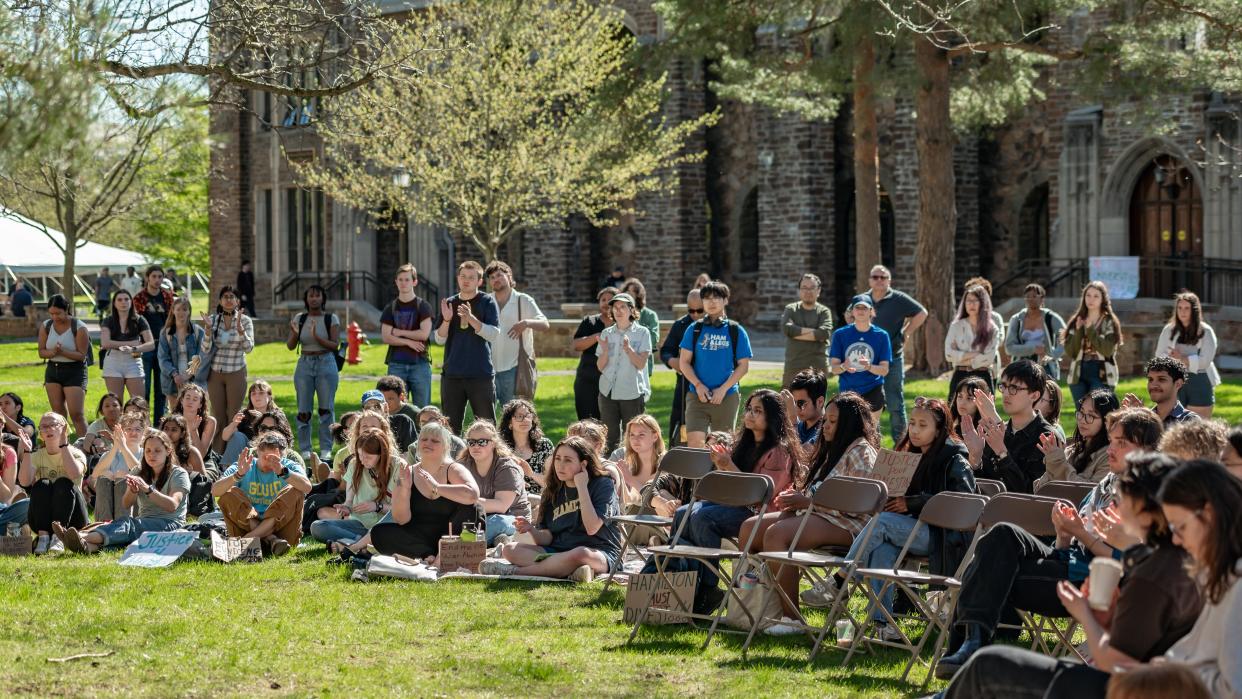
Griffo was not present at Thursday's teach-in, but has spoken out publicly on protests around the state, most notably signing onto an effort to have the governor withhold funding to Columbia University following the protests there.
“Historically, I’m drawn back to the Vietnam era,” reflected Griffo. “Now, it seems to me, America is enduring a different kind of war: a verbal war.”
The formation of SJP on campus
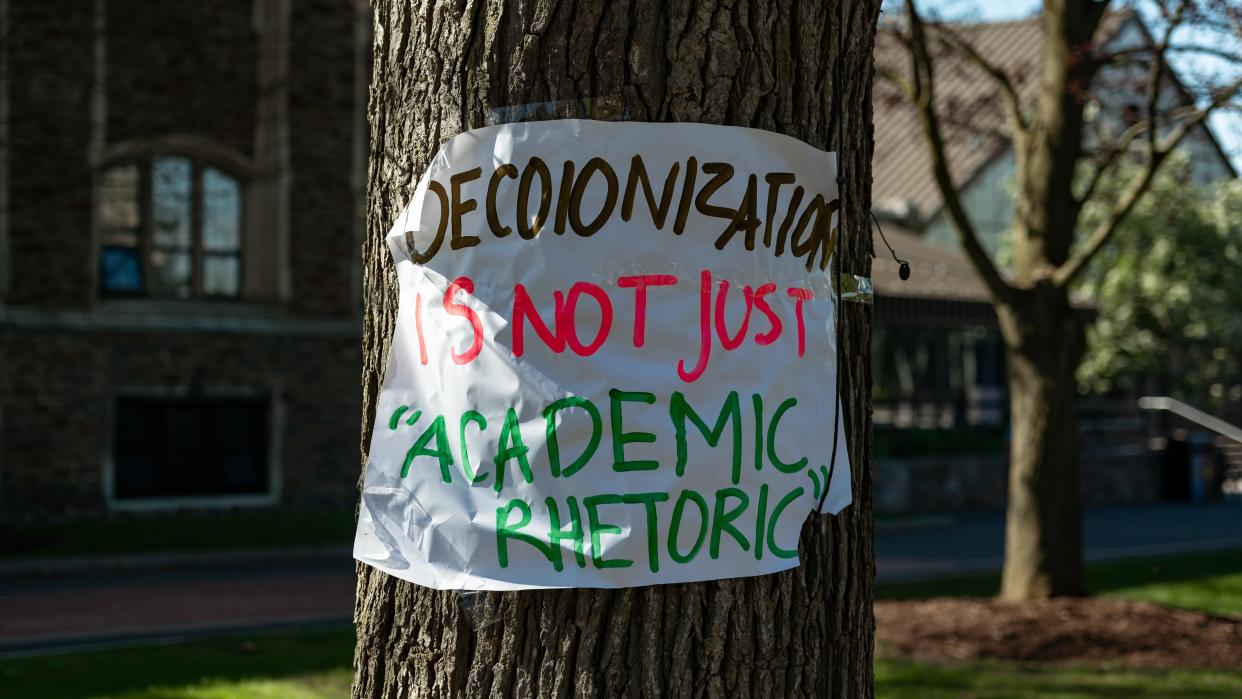
The SJP chapter at Hamilton College began developing prior to the Hamas attacks on Oct. 7.
As stated by organization leaders, the initial goal was to spread education about what they call the state of Israel’s long-standing policy of apartheid. As tension abroad arose, so did SJP’s commitment to organize protests to raise awareness, advocate for policy change, and garner fundraising for humanitarian aid, they said.
With burgeoning activity from SJP chapters across the country – Columbia University, Williams College, New York University – the group said the “time to act was now.”
Although the group aims to address the perceived gap in awareness by means of open dialogue, many pro-Israel Jews on campus admitted to feeling slighted by the “unavoidable public displays of opinion.”
Hamilton College faculty speaks out
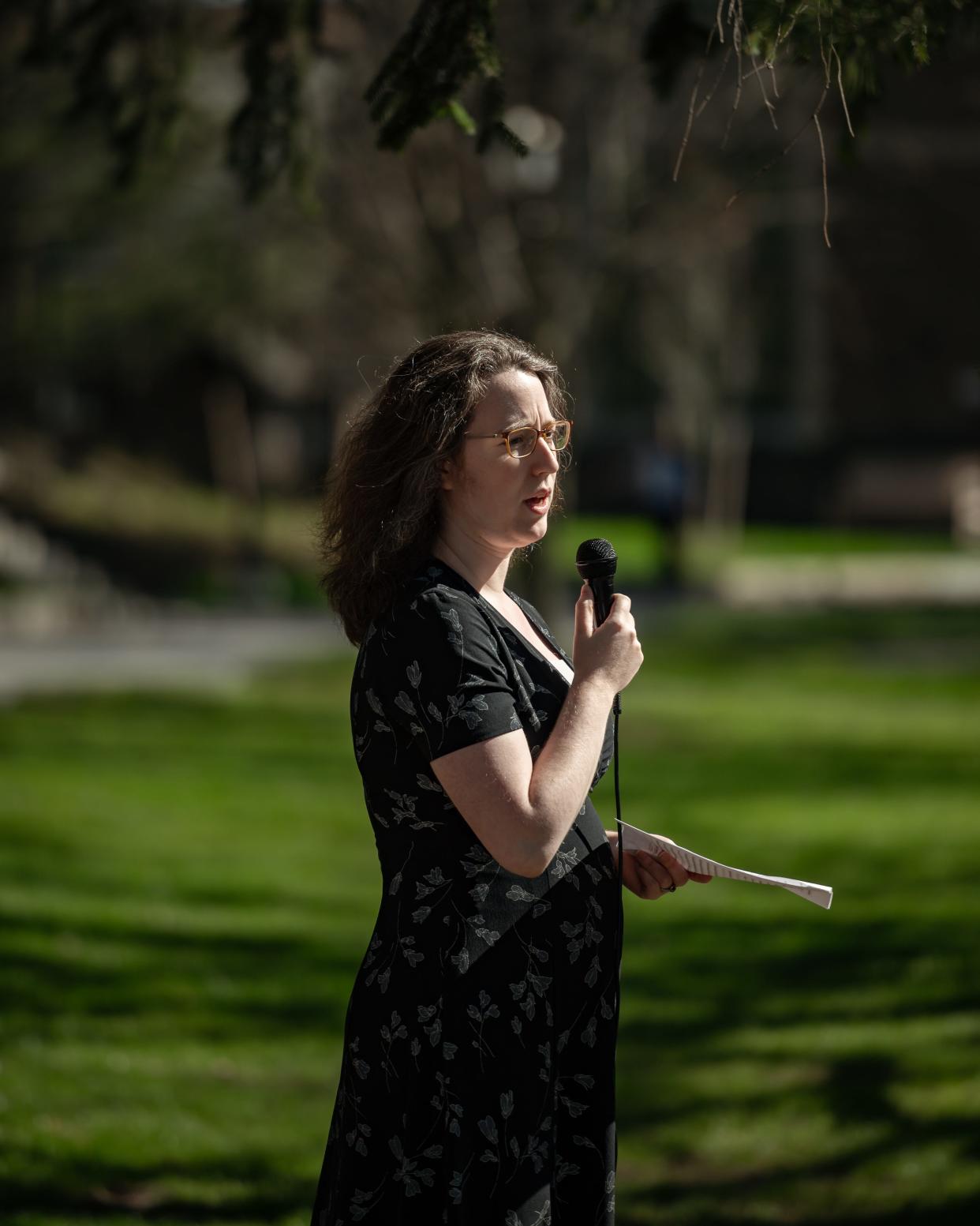
SJP called the May 2 event a “solidarity gathering.”
There were no encampments, just a few scattered posters duct taped to trees lining West Quad and chairs for onlookers to tune into the conversation.
Several faculty members spoke at the demonstration, including visiting assistant professor of history Rebecca Gruskin, assistant professor of women and gender studies Man Kaplan, and assistant professor of literature and creative writing Jane Robbins Mize, among others.
Kaplan staked the claim that civil activism allows participants to grow in political consciousness, empathy, and critical thinking skills.
Mize agreed and admitted she was "too afraid” to discuss how American identity and Israeli identity are linked in her classical literature course, but felt fortunate to have been given the space to “speak out.” She went on to recite an excerpt from the conclusion of Our American Israel by Dr. Amy Kaplan.
As stated by Mize, the teach-ins against the genocide in Gaza are helping private institutions (like Hamilton College) and the government at large “see the mirror itself.”
Towards the end of the event, there was an opportunity for public comment during which junior Diego Inzunza took the microphone.
“During this Apartheid we need to remember the Palestinians' humanity,” urged Inzunza. “Their lives are just as valuable as ours.”
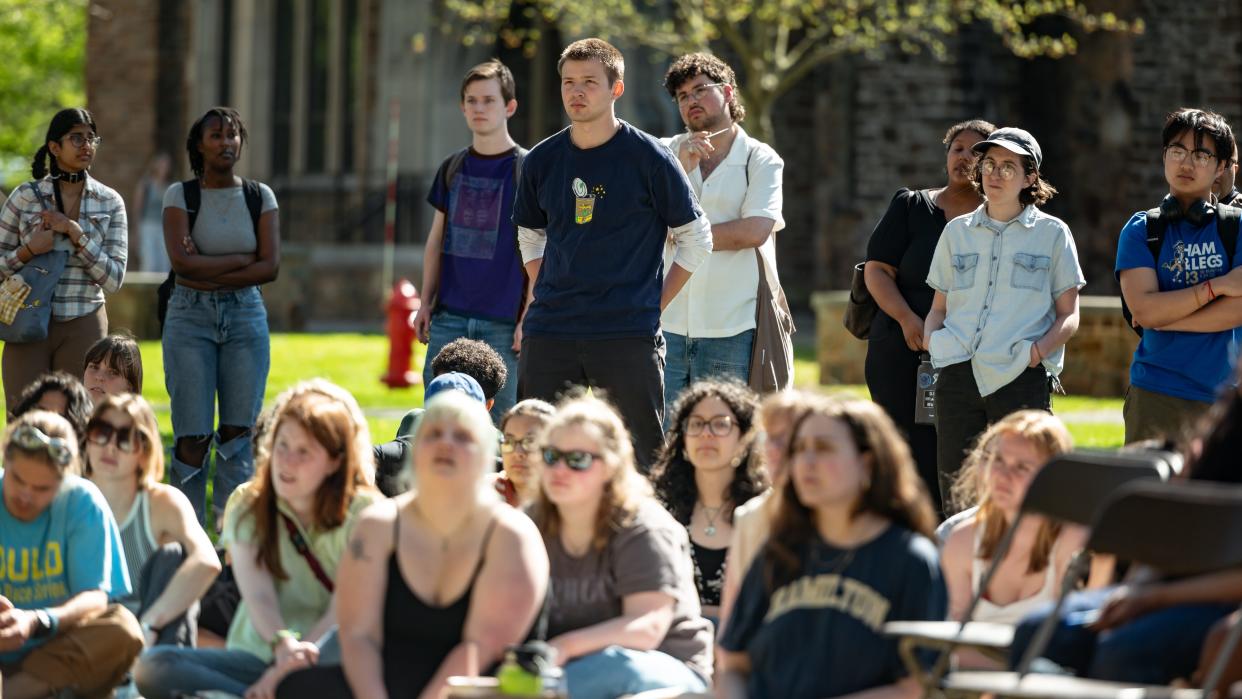
Administration takes a neutral stance
Nationally, pro-Palestinian advocacy groups have been met with backlash.
In March, four Columbia University students were suspended indefinitely and evicted from their college housing for their involvement in an unauthorized “Resistance 101” event. Previously, Columbia had suspended its SJP chapter.
Similarly, on April 19 students at Pomona College were arrested and placed on interim suspension during a pro-Palestine demonstration.
According to the school’s social justice paper, at the March faculty meeting Hamilton College President David Wippman disclosed that he'd received more than 75 letters from emails, students, and alumni regarding the escalated campus climate. He reiterated his stance, as a leader, which is to “encourage thoughtful dialogue as opposed to tightening restrictions.”
Sophomore Jacob Shulman attends local Chabad regularly.
“A group of us have spoken to President Wippman and Vice President for Diversity, Equity and Inclusion Sean Bennett,” said Shulman. “Understandably the administration is letting students speak freely. I'd hoped President Wippman would have taken a more outspoken or proactive approach, being Jewish himself, but I understand his predicament.”
'Just trying to get through finals'
Shulman recently went on a trip to Poland to learn about the Holocaust with a group of 60 other Jewish students from universities nationwide.
“It's made me grateful to be at Hamilton, where the tension is a lot lower than say Columbia University,” mentioned Shulman. “There aren’t active arrests or outright incitement of violence but things have been ramping up ever so slowly since the formation of SJP.”
As a history major, Shulman acknowledged that the current state of affairs was anticipated. “This has all been brewing for quite some time and unfortunately I don’t find it surprising,” he said.
Shulman said that for months on end SJP was distributing printed pamphlets and digital material with anti-Semitic statements, claiming that "Jews aren't indigenous to Israel."
“Social media is the big X Factor,” emphasized Shulman. “The other day my friend posted a picture holding an Israeli flag and there were over 200 hate comments. Social media creates a shield for people to say harsh things than they normally wouldn’t say in person. It also allows the rapid mobilization of groups without credible sources to spread disinformation. I believe it's responsible, more broadly, for the partisanship divide we’re seeing today as well as this movement incurring on college campuses.”
Shulman expressed gratitude for the resources at his disposal on campus. He shucked current circumstances up to a “few bad apples” that sparked "inappropriate initiatives."
“I’m just trying to get through finals and finish things up,” sighed Shulman.
'The wedge seems to be getting deeper'
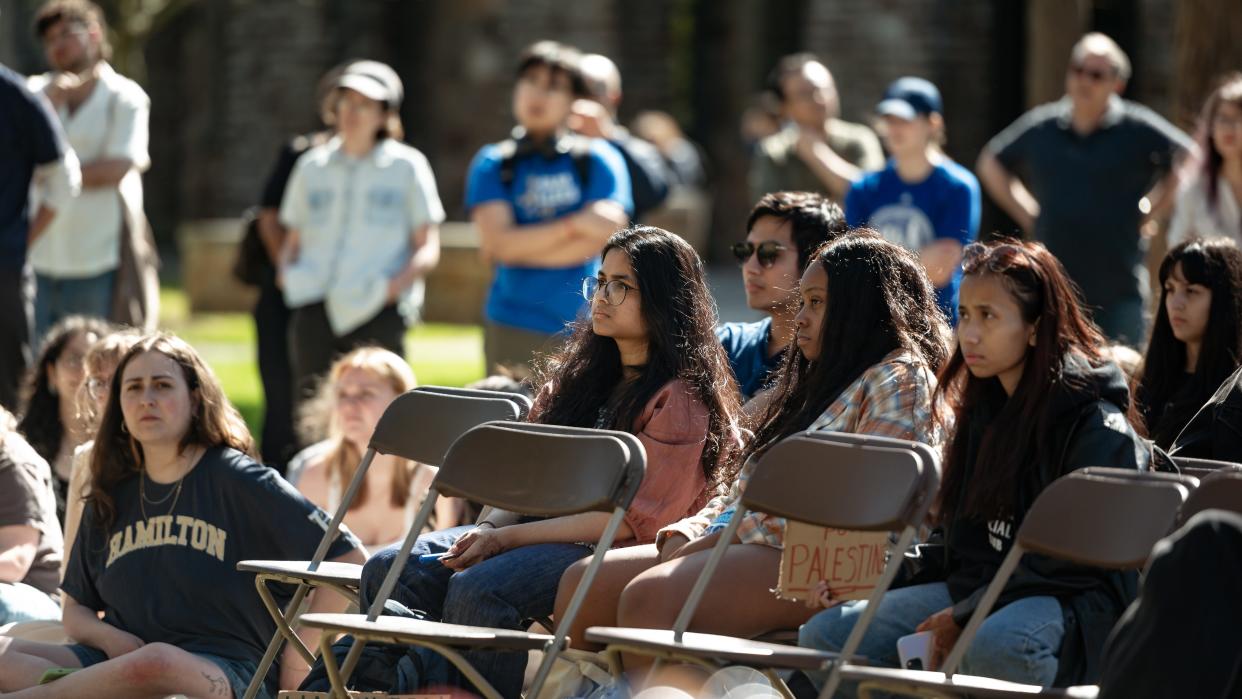
Rabbi Didy and Devorah Waks established the Chabad of Clinton in 2014. The independent non-profit organization is neither affiliated with nor sponsored by Hamilton College.
As part of the Chabad on Campus network, the Waks' goal is to serve the students and faculty of Hamilton College as well as the local Jewish community.
“SJP has a troubled history, dabbling in many anti-Semitic tropes which deny basic Jewish history,” argued Didy. “The ‘you're either with me or against me’ mentality has become pervasive on college campuses and Hamilton seems to be no exception. Students are forced to take extreme views in order to be accepted.”
When asked how national tension has infiltrated the campus Didy acknowledged that more and more students have voiced individual concerns.
“Many have lost friends because they were suspected of Zionism beliefs; the wedge seems to be deepening and it's terrible to watch,” he said.
Up until Thursday, junior Lane Barsch felt blessed to be at a “utopia anomaly" of campuses.
She expressed disappointment that many of her professors had spoken at the teach-in.
“As an anthropology major here everyone is pretty much pro-Palestine,” explained Barsch. “Faculty in the women’s studies, anthropology, and history departments were all at the SJP gathering. I didn’t put my glasses on when I walked past because I didn’t want to see what was going on. It makes me question pursing this discipline when I seem to be one of only pro-Israel Jews in the program.”
Barsch understands that as part of a worker union professors are allowed to stand up to the college and voice their opinions. “But the students they teach are still developing and they get caught in the crossfire,” she said.
This article originally appeared on Observer-Dispatch: Hamilton College teach-in: a closer look at the situation
